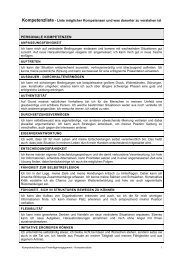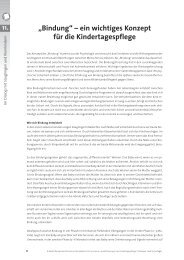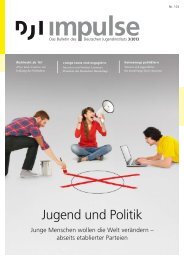download - Deutsches Jugendinstitut e.V.
download - Deutsches Jugendinstitut e.V.
download - Deutsches Jugendinstitut e.V.
You also want an ePaper? Increase the reach of your titles
YUMPU automatically turns print PDFs into web optimized ePapers that Google loves.
to return to learning. Above all, education and learning must be relevant and<br />
meaningful to the learner, though their reasons for engagement may be very different.<br />
2. We need to think much more about public sector support for vocational training,<br />
labour market and enterprise initiatives. Many young people now find themselves<br />
excluded from the private sector competitive labour market. Neither they, nor<br />
society, wants them to live without ‘occupation’ or on welfare, nor do we want to<br />
contemplate some kind of ‘custodial democracy’ (as being advocated by some in<br />
the USA) whereby we secure safe lives by the massive incarceration of others.<br />
Serious attention to public programmes of work for the young unemployed, and<br />
wider attention to ‘work-life balance’ for the employed is urgently required.<br />
3. We must look at the idea of ‘purposeful’ leisure-time activity for young people. This<br />
does not necessarily have to be either organised or accredited! But it must be<br />
concerned with enabling young people not to opt for more destructive life-style<br />
choices, such as substance misuse or criminality.<br />
4. Throughout young people’s lives, we must be looking at supporting shared<br />
experiences with others: those from both privileged and less advantaged<br />
backgrounds, those from different faiths and ethnic backgrounds, those from urban<br />
and rural areas.<br />
5. There need to be timely services for young people facing ‘problems’ in their lives.<br />
6. There need to be timely responses to young people creating ‘problems’ in their lives.<br />
7. Finally, we must pay much more serious attention to the question of access routes<br />
to opportunity and experience. We must do more than simply provide an enabling<br />
context (“you can join in if you want to”) and think of ways of providing an<br />
ensuring context (“this is what all young people should have a taste of”).<br />
The Milltown Boys<br />
In 1973, I accidentally met a group of young teenagers from a ‘disadvantaged<br />
neighbourhood’. I spent five years with them, partly as a youth worker, partly as a researcher.<br />
I ‘hung around’ with them at all hours of the day. They were an early group of the<br />
‘disengaged’. They left school with very few, and usually no qualifications. They all had<br />
criminal records.<br />
In 2000, 27 years later, I followed up a significant number of the ‘Milltown Boys’. I<br />
learned that seven (out of 67) were already dead, before the age of 40. None of them had<br />
died from natural causes. On the other hand, about a third had done quite well, so I noted in<br />
the introduction to my book (Williamson 2004) that their story is as much a celebration of<br />
success as a commiseration with failure. But it is also a miserable story – one of long term<br />
unemployment, criminality, addictions, broken relationships, loss of contact with children,<br />
and so on. I am convinced that, had stronger policy reached these individuals during their<br />
younger days, many more could have been helped on to a more positive pathway through<br />
their lives.<br />
Without any support, many of the Milltown Boys still have to try to live a life. As Cloward<br />
and Ohlin (1960) reported, young people react in different ways to what they called ‘blocked<br />
opportunity structures’. Some (a considerable proportion) turn to crime, to realise<br />
103

















